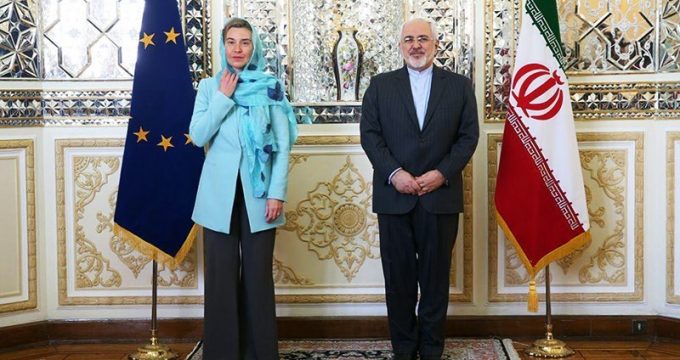PHOTO: European Union’s Federica Mogherini and Iranian Foreign Minister Mohammad Javad Zarif in Tehran on Saturday
The European Union has given Iran’s Rouhani Government a much-needed boost, pledging cooperation and distancing itself from US sanctions on Tehran’s ballistic missile tests.
The EU’s head of foreign policy, Federica Mogherini, delivered the good news through a joint statement with Iranian Foreign Minister Mohammad Javad Zarif on Saturday.
The two sides pledged support for full implementation of the July 2015 nuclear deal, under pressure because of continued US financial restrictions, the missile tests, and criticism — including from the Supreme Leader — inside Iran. They committed themselves to “cooperative relations” in areas such as economic development and human rights, and they declared promotion of “regional peace, security, and stability” and the Rouhani Government’s “dialogue and engagement”.
“It is in the European interest and in the Iranian interest to make sure that banks engage and feel confident to come to Iran and facilitate and support this new economic engagement,” Mogherini said.
The meeting came amid a tougher line by Iran on the Syrian crisis, with the deployment of Army units as well as the Revolutionary Guards to frontlines in the five-year conflict. The Rouhani Government has been challenged as weak and accommodating of the US, with hardliners even accusing officials of appeasement of “foreign-led” sedition.
Quiet on Human Rights, Care on Missiles and Syria
Promising regular consultation through the establishment of a full diplomatic mission in Tehran, the EU refrained from any criticism of Iran’s human rights record — a contrast to a series of scathing reports by UN Special Rapporteur Ahmed Shaheed on executions, detentions, and repression of rights and free speech.
“Today is a new beginning in Iran and EU relations. We hope this cooperation between the Iranian nation and European Union brings about shared interests and global development,” Zarif told the press conference.
In contrast to the US — which repeated this week that Iran will not be granted access to the American financial system — the EU pledged a series of steps for economic cooperation, including in banking, investment, and trade. The Rouhani Government was supported by commitments for investment in the energy sector, as well as cooperation on climate change.
Zarif used the conference to draw out the contrast between the EU and US positions, urging Washington to remove obstacles to Iranian access to the global financial system.
There was no reference in the statement over Iran’s missile tests, even though European countries as well as the US have said they will take the matter to the UN Security Council as Washington passes new sanctions on entities and individuals linked to the Revolutionary Guards.
Mogherini said that she did not the missile tests as a breach of the nuclear deal, although she added:
This doesn’t mean that we are not concerned. On the contrary, we see this as a worrying step…and we are encouraging (Iran) to abstain from further steps.
The Syrian conflict, in which Iran has escalated military intervention behind the Assad regime, was treated carefully. Beyond the general language over “channels of dialogue” and “mutual trust and understanding”, the two side said there would be “humanitarian coordination” over the crises in Syria, Iraq, Yemen, and Afghanistan.
The Iranian regime even got a reference to “constructive approaches that reinforce the principles of non-interference and the territorial integrity of states”, language that it has used to justify its essential support of President Assad in the Syrian uprising.

